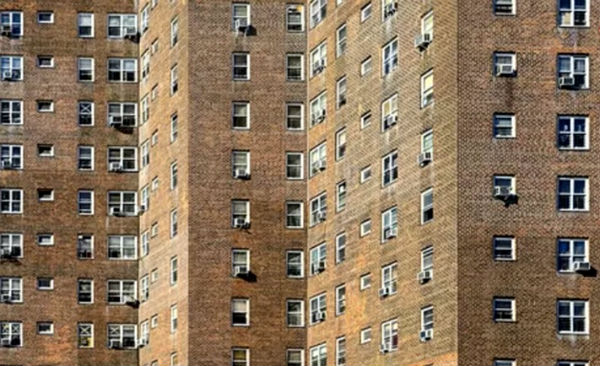 Still grappling with the implications of record cuts to federal public housing funding for 2017, NYCHA Chair Shola Olatoye joined Senator Chuck Schumer outside the Elliot Houses in Chelsea on Tuesday to predict the impact of additional multi-million dollar cuts laid out in President Donald Trump’s draft “skinny budget” for Fiscal Year 2018.
Still grappling with the implications of record cuts to federal public housing funding for 2017, NYCHA Chair Shola Olatoye joined Senator Chuck Schumer outside the Elliot Houses in Chelsea on Tuesday to predict the impact of additional multi-million dollar cuts laid out in President Donald Trump’s draft “skinny budget” for Fiscal Year 2018.
A 68 percent cut in HUD’s capital budget, which is still pending congressional approval, would result in a $216 million cut for NYCHA, Olatoye said. NYCHA already has a backlog of approximately $17 billion in unmet capital needs, and has historically received about $300 million annually from the feds. Trump’s proposal would cut that funding by approximately two thirds, a spokeswoman said.
“We should be increasing the federal investments we make in HUD and NYCHA, not taking a meat axe to the affordable housing budget,” stated Schumer, who pledged to fight the cuts in Washington.
NYCHA’s capital priorities include fixing boilers and elevators, repairing brickwork on building exteriors, and replacing kitchens and bathrooms. According to the authority, more than 4,000 NYCHA residents across 20 buildings could face elevator service interruptions if these cuts go through. More than 1,500 apartments would go without bathroom or kitchen renovations; 27 NYCHA buildings would go without facade repair.
Additionally, NYCHA predicts that a thirteen percent cut to HUD’s operating budget would cut between $100-150 million from New York City. NYCHA closed out 2016 with a surplus of $21 million in operating funds—money that goes towards janitorial salaries, plumbing, electricity, mold and lead paint remediation, and other daily repairs. However, the record $35 million cut reported last month sent that budget $14 million in the red.
Approximately 1,200 staff members would be laid off under Trump’s budget, according to NYCHA.
Advocates say cuts would make a dire situation much worse. “As it stands, it often takes a lawsuit to bring attention to repair issues for our clients in public housing,” Stephanie Rudolph, senior attorney with the Urban Justice Center, told Gothamist recently. “Even with litigation, NYCHA can take months or even years to perform repairs in a way that prevents the condition from reoccurring.”
Olatoye recently testified before the City Council that NYCHA now has no choice but to fully embrace NextGeneration Neighborhoods: a controversial plan launched in 2015 that entails selling off chunks of NYCHA land to private developers in order to put a dent in the authority’s multi-billion deficits.
Giancarlo Fernandez, 29, lives in the Carver Houses in Spanish Harlem. “If someone is telling me to give a chance to developers, that this is what’s going to fix NYCHA—when we have a developer in the White House making cuts to NYCHA,” Fernandez previously told Gothamist. “I don’t see how that’s a solution.”
Critics and many NYCHA residents are deeply troubled by the idea of turning to private developers to save a public asset, especially under a Trump administration that heavily favors privatization. Giancarlo Fernandez, 29, lives in the Carver Houses in Spanish Harlem. “If someone is telling me to give a chance to developers, that this is what’s going to fix NYCHA—when we have a developer in the White House making cuts to NYCHA,” Fernandez previously told Gothamist. “I don’t see how that’s a solution.”
New York City’s 2016 NYCHA investment plan of $242 million was an increase over the previous year’s $210.5 million. Mayor de Blasio also recently announced a $1 billion investment for roof replacement over the next decade.
NYCHA is the country’s largest public housing authority, with more than half a million residents.
HUD did not immediately respond to a request for comment.
Via source
Become a Harlem Insider!
By submitting this form, you are consenting to receive marketing emails from: . You can revoke your consent to receive emails at any time by using the SafeUnsubscribe® link, found at the bottom of every email. Emails are serviced by Constant Contact








